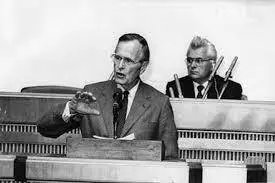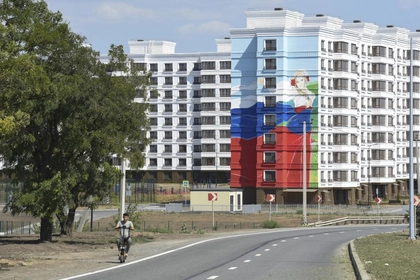When the Soviet Union began to fall apart, the very idea of no USSR seemed to be more than Washington - and others - could grasp.
Consternation over uncontrollable changes and challenges seemed to override what had been suggested American policy for decades.
JOIN US ON TELEGRAM
Follow our coverage of the war on the @Kyivpost_official.
Rhetoric about the Soviet Union, demands for freedom for those living behind the Iron Curtain spoken with passion during annual Captive Nations Week rallies across the country, was abruptly abandoned.
Even a mere few weeks before the Declaration of Ukrainian Independence on Aug. 24, 1991, overwhelmingly approved by the Ukrainian Parliament, the decades of seeming support for those Captive Nations was reversed dramatically during the infamous so-called Chicken Kyiv speech by U.S. President George Bush in 1991.
For decades, foreign policy officials had been instructed and advised by Sovietologists and Kremlinologists whose cortex was Moscow.
The U.S. Department of State, National Security Council and the foreign studies departments in universities, pipelines for government experts, knew, and were comfortable with, the world as it was.
Ukraine? Kazakhstan? What and where were these places?
Not only were the potential changes beyond comprehension; the alternative possibilities were downright scary.
In September 1990, I spoke at the Second Congress of Rukh, the Popular Movement of Ukraine that was held in Kyiv.

IMF Approves $1.1 Billion Loan Disbursement to Ukraine Before Trump Inauguration
I suggested that as the people of Ukraine moved toward independence, there needed to be an understanding in Kyiv that in the United States, as well as in most of the West, the concepts of "Soviet Union" and "Russia" were synonymous.
The USSR was Russia and Russia was the USSR. Ukraine was little known outside the country’s dedicated Diaspora.
An independent Ukraine, I posited, would be a challenge for the United States to accept. More than once, I had difficulty convincing leading Ukrainians that, truly, official Washington was that unaware and that ill-informed.
After the resounding fall of the USSR, the West’s poorly-advised governments and ill-educated societies were confronted with a staggering change in their reality, one for which they were unprepared and to which they never fully adapted.
As more than a dozen new nations appeared, Russia, specifically Moscow, was still the center for policy decisions and initiatives.
Three decades later, and this confused grasping for the familiar lingers on, and is resulting again in what is essentially an inexcusable lack of strategic thinking.
Much of official Washington – certainly the last three administrations – still viewed Russia as the powerful Russia that was understood as a synonym for the Soviet Union.
However, it was a Russia that never was.
Relevant to today is the fact that never having really known Ukraine, Washington was susceptible to the Kremlin’s propaganda.
The misunderstanding of both Russia and Ukraine have led to Washington’s initially confused, then overly cautious approach to Putin’s war on Ukraine.
This conflicted, even feckless, strategy of support for Ukraine, while not really wanting Russia to lose has resulted in a strategic stalemate for the West.
While the current administration has effectively corralled European allies to support Ukraine and the U.S. Congress has provided significant support to Ukraine, the lingering legacy of poor American understanding and awareness is significantly responsible for the bifurcated and nonsensical "Ukraine must not lose, but Russia must not lose either" approach that drags out this war, with the accompanying death and destruction.
Ukraine was, is and will be
Not for here is the dissolution of Putin’s passionate myths claiming Ukrainian history as Russia’s own.
However, our not knowing or understanding Ukraine or what the people of Ukraine were accomplishing resulted in an arrogant ignorance and an attitude which did not take Ukraine seriously.
Even worse, there was almost universal complicity in ascribing the successes and contributions of Ukraine and Ukrainians to Russia and Russians.
Had we known Ukraine, what Ukraine and Ukrainians historically have accomplished, we could have avoided doubts about Ukraine and not made many unjustified assumptions about the strength of Russia.
Ukraine is not and never was a third world country. If we saw strength in the Soviet Union and Russia, we should have seen strength in Ukraine.
Here are just two examples of instances where the Kremlin "line" continues to hide the truth.
The years-long "space race" between the U.S. and the Soviet Union.
Think of the shock of Oct. 4, 1957, when the Soviet Union launched the first artificial satellite into the earth’s orbit. "Russia is ahead" was the American fear.
But who supervised the development of that satellite program, and who was the architect of the "Russian or Soviet" space program?
The Kremlin kept Ukrainian Serhiy Korolyov’s name classified until the time of his death. Even the Nobel Committee made inquiries years before as they wanted to award him the Nobel Prize.
Soviet leader Nikita Khrushchev denied the request, saying the space program was the accomplishment of the Soviet people.
Here's one more example of a wrongful claim made by Russia.
It continuously claims that it won World War II, or at a minimum that the war could not have been won without it.
Russia was one of the 15 separate republics of the Soviet Union. All the republics suffered military and civilian deaths in fighting the war.
There’s no question that Russia, the largest of the republics with a population of 110,100,000 lost the largest number of its citizens - 13,950,000 or 12.7 percent of its population. But Ukraine with a population of 41,340,000 and 6,850,000 deaths lost the greatest percentage of its population during the war among all of the republics – 16.3 percent.
Russia was never what it claimed to be, and Ukraine was and is much more than has been understood.
Washington’s fear of a Russian defeat has prevented strategic thinking about the very real possibility of such a result. The U.S. Administration has not addressed what to do when Ukraine defeats Russia and has not fully accepted the need to think strategically about what happens when Putin loses.
Straddling the fence is not a policy and cannot be a goal.
Washington needs to accept that regardless of the form – Russian Empire, Soviet Union, or post-Soviet Russia – the Kremlin has been imperialist in its ideology and actions, a consistent threat to neighboring countries and a destabilizing force around the globe.
Washington needs to accept that which has been said many times in many places: the Kremlin’s objective is not just Ukraine.
Putin’s speeches have laid bare for years the intention to recreate the Russian Empire. To ignore or downplay Putin’s often and clearly stated objectives would be foolish and irresponsible.
He should be taken at his word. The time is long passed for this U.S. Administration to destroy the know-nothing arguments in Congress and elsewhere who think Ukraine is not important to the United States and Europe and to explain in the simplest of terms how our giving Ukraine what it needs is both cost effective and in our own national security interests.
It's of no consolation for Ukrainians, but Putin’s misreading of Ukraine and the people of Ukraine was even worse than ours.
He obviously believed his farcical KGB version of Russian history and believed that he could take Ukraine quickly.
He still seems incapable of grasping the reality that the people of Ukraine knowingly and willingly rejected Moscow and Russia in 1991 and now would rather die for the freedom they have had for three decades than live as slaves again.
Back in the late 1960s during one of the annual U.S.-USSR Track Meets, sportscaster Jim McKay of ABC’s Wide World of Sports started to interview Valeriy Borzov, the then 100 meter champion, saying "I am here with the great Russian sprinter Valeriy Borzov". Borzov interrupted by saying, "I am not Russian, I am Ukrainian". and walked away.
We did not get the message back then, but it is time that we did.
We now know the people of Ukraine will fight, but can only win with our strong and continued support.
Instead of asking what will happen if Russia loses, ask what will happen if Ukraine loses.
Washington must give Ukraine everything necessary to defeat Russia. And unlike Russia, a free and strong Ukraine can be a critically situated stabilizing force in the world well into the 21stt century.
The 19th and 20th centuries are over. It’s time to move forward.
Robert McConnell
Co-Founder of the U.S.-Ukraine Foundation
Director External Affairs of the Foundation’s Friends of Ukraine Network (FOUN)
The views expressed in this article are the author’s and not necessarily those of Kyiv Post.
You can also highlight the text and press Ctrl + Enter






